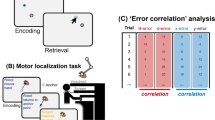Abstract
Recall and imagery of familiar, distant places occurs in a specific orientation which has been shown to be biased towards the airline direction from the location where recall occurs to the target [11]. This effect has implications for the interaction of different types of spatial representations, such as egocentric working memory and allocentric long-term memory. Here we address the following questions: (i) Does the effect scale with the distance between recall location and target in a continuous way? (ii) Does the effect that was originally demonstrated with sketch maps also occur in a reconstruction task with landmark models? (iii) Does the effect also occur in virtual environments? Results show that hypotheses (ii) and (iii) can be confirmed while more work is needed for hypothesis (i).
Supported by the Deutsche Forschungsgemeinschaft under grand no. MA1038\(\mid \)15-1.
Access this chapter
Tax calculation will be finalised at checkout
Purchases are for personal use only
Similar content being viewed by others
References
Avraamides, M.N., Kelly, J.W.: Imagined perspective–changing within and across novel environments. In: Freksa, C., Knauff, M., Krieg-Brückner, B., Nebel, B., Barkowsky, T. (eds.) Spatial Cognition 2004. LNCS (LNAI), vol. 3343, pp. 245–258. Springer, Heidelberg (2005). https://doi.org/10.1007/978-3-540-32255-9_15
Bisiach, E., Luzzatti, C.: Unilateral neglect of representational space. Cortex 14(1), 129–133 (1978)
Guariglia, C., Padovani, A., Pantano, P., Pizzamiglio, L.: Unilateral neglect restricted to visual imagery. Nature 364(6434), 235–237 (1993)
Klatzky, R.L.: Allocentric and egocentric spatial representations: definitions, distinctions, and interconnections. In: Freksa, C., Habel, C., Wender, K.F. (eds.) Spatial Cognition. LNCS (LNAI), vol. 1404, pp. 1–17. Springer, Heidelberg (1998). https://doi.org/10.1007/3-540-69342-4_1
Langbehn, E., Lubos, P., Steinicke, F.: Evaluation of locomotion techniques for room-scale VR: joystick, teleportation, and redirected walking. In: Proceedings of the Virtual Reality International Conference-Laval Virtual, pp. 1–9, April 2018
Mallot, H.A., Basten, K.: Embodied spatial cognition: biological and artificial systems. Image Vis. Comput. 27(11), 1658–1670 (2009)
Marchette, S.A., Ryan, J., Epstein, R.A.: Schematic representations of local environmental space guide goal-directed navigation. Cognition 158, 68–80 (2017)
Meilinger, T., Frankenstein, J., Simon, N., Bülthoff, H.H., Bresciani, J.P.: Not all memories are the same: situational context influences spatial recall within one’s city of residency. Psychon. Bull. Rev. 23(1), 246–252 (2016)
Péruch, P., Belingard, L., Thinus-Blanc, C.: Transfer of spatial knowledge from virtual to real environments. In: Freksa, C., Habel, C., Brauer, W., Wender, K.F. (eds.) Spatial Cognition II. LNCS (LNAI), vol. 1849, pp. 253–264. Springer, Heidelberg (2000). https://doi.org/10.1007/3-540-45460-8_19
Riecke, B.E., McNamara, T.P.: Where you are affects what you can easily imagine: environmental geometry elicits sensorimotor interference in remote perspective taking. Cognition 169, 1–14 (2017)
Röhrich, W.G., Hardiess, G., Mallot, H.A.: View-based organization and interplay of spatial working and long-term memories. PLoS ONE 9(11), e112793 (2014)
Waller, D., Montello, D.R., Richardson, A.E., Hegarty, M.: Orientation specificity and spatial updating of memories for layouts. J. Exp. Psychol. Learn. Mem. Cogn. 28(6), 1051 (2002)
Author information
Authors and Affiliations
Corresponding author
Editor information
Editors and Affiliations
Rights and permissions
Copyright information
© 2020 Springer Nature Switzerland AG
About this paper
Cite this paper
Le Vinh, L., Meert, A., Mallot, H.A. (2020). The Influence of Position on Spatial Representation in Working Memory. In: Šķilters, J., Newcombe, N., Uttal, D. (eds) Spatial Cognition XII. Spatial Cognition 2020. Lecture Notes in Computer Science(), vol 12162. Springer, Cham. https://doi.org/10.1007/978-3-030-57983-8_4
Download citation
DOI: https://doi.org/10.1007/978-3-030-57983-8_4
Published:
Publisher Name: Springer, Cham
Print ISBN: 978-3-030-57982-1
Online ISBN: 978-3-030-57983-8
eBook Packages: Computer ScienceComputer Science (R0)




